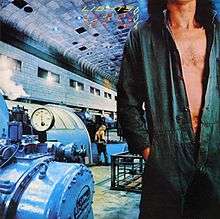Lights Out (UFO album)
Lights Out is the sixth studio album by the British rock band UFO, released in May and also on 11 October 1977 (see 1977 in music). All songs are band originals except for "Alone Again Or" which is a cover of a song by the band Love. Reaching #23 on the Billboard Hot 100, it remains the band's highest charting album in the United States.
| Lights Out | ||||
|---|---|---|---|---|
 | ||||
| Studio album by | ||||
| Released | 7 May 1977 | |||
| Recorded | February–March 1977 | |||
| Studio | AIR Studios, London, UK | |||
| Genre | Hard rock, heavy metal | |||
| Length | 36:51 | |||
| Label | Chrysalis | |||
| Producer | Ron Nevison | |||
| UFO chronology | ||||
| ||||
| Singles from Lights Out | ||||
| ||||
| Review scores | |
|---|---|
| Source | Rating |
| AllMusic | |
The album was UFO's first to feature lush string arrangements alongside more complex song structures than their previous albums. Producer Ron Nevison brought in Alan McMillan to handle the string and horn arrangements. The most notable song to feature the orchestral coloring was "Love to Love". It is also the first UFO album to feature Paul Raymond on keyboards and guitar.
In 1994, a CD comprising this album and No Heavy Petting was released by BGO Records. 2008 EMI's remastered edition includes 4 live bonus tracks, recorded at The Roundhouse, London. The album cover erroneously states that these tracks were recorded in 1976, but the correct year is 1977. EMI did correct the writing credits, with Paul Raymond finally being credited for his contributions.
The title track and "Love to Love" were featured in the 1999 movie Detroit Rock City. "Love to Love" was also covered by Djali Zwan for the 2002 movie Spun and by Europe for their 2008 live album Almost Unplugged.
Kerrang! magazine listed the album at No. 28 among the "100 Greatest Heavy Metal Albums of All Time".[2]
Steve Harris - primary songwriter, founder, leader and bassist of British heavy metal band Iron Maiden - calls "Love to Love" his favourite song.[3]
Track listing
| No. | Title | Writer(s) | Length |
|---|---|---|---|
| 1. | "Too Hot to Handle" | Pete Way, Phil Mogg | 3:37 |
| 2. | "Just Another Suicide" | Paul Raymond, Mogg | 4:58 |
| 3. | "Try Me" | Michael Schenker, Mogg | 4:49 |
| 4. | "Lights Out" | Schenker, Andy Parker, Mogg, Way | 4:33 |
| No. | Title | Writer(s) | Length |
|---|---|---|---|
| 5. | "Gettin' Ready" | Schenker, Mogg | 3:46 |
| 6. | "Alone Again Or" (Love cover) | Bryan MacLean | 3:00 |
| 7. | "Electric Phase" | Way, Mogg, Schenker | 4:20 |
| 8. | "Love to Love" | Schenker, Mogg | 7:38 |
| No. | Title | Length |
|---|---|---|
| 9. | "Lights Out" | 5:14 |
| 10. | "Gettin' Ready" | 4:03 |
| 11. | "Love to Love" | 7:15 |
| 12. | "Try Me" | 4:03 |
- The Date of the live shows is wrong in the cover and the booklet. The show that these songs were played was not on 1976, but April 2nd 1977.
Personnel
- UFO
- Phil Mogg - vocals
- Michael Schenker - lead guitar[4]
- Paul Raymond - rhythm guitar, keyboards
- Pete Way - bass
- Andy Parker - drums
- Production
- Ron Nevison - producer
- Alan McMillan - horn arrangements, string arrangements
- Hipgnosis - cover art
Charts
Album - Billboard (United States)[5]
| Year | Chart | Position |
|---|---|---|
| 1977 | Pop Albums | 23 |
References
- Kantor, Matt. "Lights Out - UFO". Allmusic. Retrieved 19 January 2015.
- Guy, Lyn (21 January 1989). "UFO 'Lights Out'". Kerrang!. 222. London, UK: Spotlight Publications Ltd.
- "Bruce Dickinson, Steve Harris, Adrian Smith and Dave Murray Interview". Maidenfans.com. 2013. Archived from the original on 2016-12-20. Retrieved 2016-12-07.
- Saulnier, Jason (23 January 2009). "Michael Schenker Interview". Music Legends. Retrieved 6 May 2013.
- "Lights Out Billboard Albums". AllMusic. Rovi Corporation. Retrieved 2011-08-02.